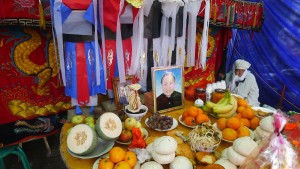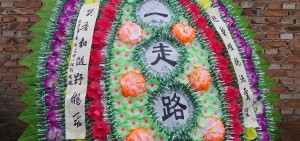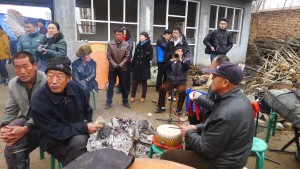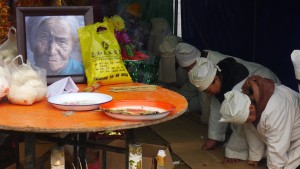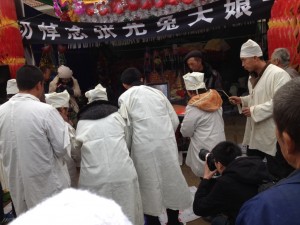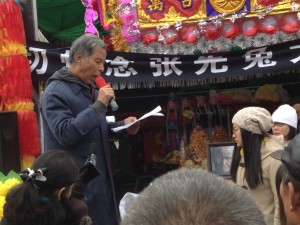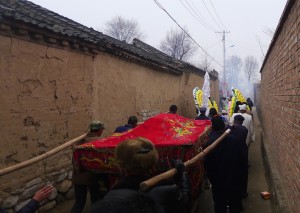On Friday Nov 20th I arrived in XiYan town in Yu county, Shanxi for the funeral of Zhang Xiantu. She was the last surviving member of a group of comfort women that sued the Japanese government in 1995. In 2007 a top court in Japan recognized the crime but rejected the compensation claims.
I came to Shanxi because a few weeks earlier in Beijing we had a major contemporary group exhibition which I co curated with Fion Gunn “Intimate Transgressions” dealing with the issue of sexual violence as a weapon of war (click here for previous post). This large group exhibition will continue to visit cities in 2016 within China and Asia before going to Australia and Europe.
One of our artists Gao Yuan had researched the comfort women in Yu county for her photography and video work and we had chosen Gao’s portrait of Zhang Xiantu for the large poster outside Inter gallery in 798. Once I was kindly offered a car ride from Beijing by artist Meng Zifan and Jiang Yuchun there was no question, I was able to go.
There were stone slabs on one alley way which I was told was likely to be 300 years old. And so I couldn’t help thinking that there would have been little change to this impoverished village since the war. On entering the family farm-yard there was a fire burning wood to welcome and offer warmth for visitors, this is where I met with the funeral musicians huddled around the fire.
In the covered area was the shrine in front of which laid a variety of food and a portrait of the departed Zhang Xiantu. Behind this was a red embroidered frame encasing the coffin. To the right hand side were family members mostly grandchildren dressed in white keeping vigil and mourning.
At the back in the farm yard were some livestock. There was a large stack of corn drying and further to the left were pens of sheep bleating and behind that were hens and chickens. The musicians had started and the cooking corner filleting fish and frying shrimp had started in earnest.
Zhang Xiantu’s story
The life story of this woman has been gathered from a mixture of online sources and stories I heard from people I met at the funeral. Zhang Xiantu was the daughter of a landowner and so she would have been comparatively wealthy, had her feet broken and bound when she was a little girl. However Zhang’s life was about to bear more incredible hardships. A few months after she was married, the Japanese came to her village, she was unable to run away. She was imprisoned for 20 days. Yu county had makeshift comfort stations which were repossessed village houses or army camps unlike the official military brothels in Shanghai. She was raped punched and kicked by the Japanese soldiers trying to control Northern China in Spring of 1942. It is estimated there were 200,000 comfort women on the Korean peninsula and China who were kidnapped or coerced in to sexual slavery for the Japanese army.
Her family sold valuables and borrowed from friends and relatives to trade her back. Her father sold all his sheep and the payment ruined him. She returned back to her father’s place where she was nursed back to health even though food was very scarce. “There was nothing to eat, nothing to wear, my parents were also starving, we had nothing. ” Zhang had said in an interview with FT reporter Lucy Hornby earlier this year. Having been initially shunned by her husband’s family she was later allowed to return 2 years later. The price of her freedom ruined her family “I want the Japanese to pay the money” she was quoted.
Once she returned to her husband’s home she discovered he suffered from PTSD from the war and no treatment could remedy his shaking hand, he couldn’t feed himself yet alone support the family and so Zhang was responsible for labor along with household chores of her in laws. Over two dozen “known” comfort women survive in China most of them living in impoverished countryside areas.
The reason we know about their stories is because of a primary school teacher Zhang Shuangbing. (Although they share the same name he is no relation to Zhang Xiantu.) A few decades ago he had his first encounter with a different comfort woman. In Autumn 1982 he was out on his bike returning with students on a field trip when he noticed a lone elderly woman Hou Dong’e working alone in the only field which was not harvested. She had bound feet was kneeling cutting millet plants one by one. Zhang enquired with local villagers about this social ostracism he was told she had been brought to the Japanese fortress during the war. Moved by these difficult circumstances he wondered if he could seek government assistance for her. 10 years later comfort women in other Asian countries began to organize a movement to demand redress from the Japanese government. An article early that year by Tong Zeng stated not one single Chinese comfort woman had come forward to publicly testify. This was the beginning of Zhang Shuangbings life mission. For 30 years he wore out several bicycles crossing the provinces of Shanxi and Heibei, following the hints of villagers, locating and encouraging these elderly women to tell their painful stories, documenting their accounts and helping them file lawsuits. In July 1992 with the help of Zhang Shuangbing, Li Guiming and other local volunteers Hou Dong’e and three other survivors sent a written document to the Japanese Embassy in Beijing stating their devastating experience at the hands of the Japanese army demanding an official apology and monetary compensation. This was the first time former Chinese comfort women voiced their demand for restitution. Numerous cases have been filed since then.
On Friday Zhang Shaungbing said “a pursuit for justice will continue”
Also at the funeral were grass root volunteers and other motivated individuals, some documentary film makers of the production “Twenty Two” by filmmaker Guo Ke which will be released at the Beijing Film Academy at 6.30 on Dec 11th -admission free. Also from Hong Kong was Mei Li from HistoryWatch who had interviewed many comfort women in Shanxi and Hainan over the past few years. There were also people present from the feature film “Great Cold” by Zhang Yueping which was released in May 2015.
Many of the funeral traditions symbolize a transformation of one life into the next the breaking of the bowl into pieces hitting the ground.
Once the ceramic bowl was smashed on the ground outside the family yard the coffin was carried on it’s way after many stops at various points in the village, firecrackers released at every turn in the laneway finally making it’s way to the burial ground, the edge of a sweetcorn field.
Tomorrow November 25th is International Day for the Elimination of Violence Against Women.
